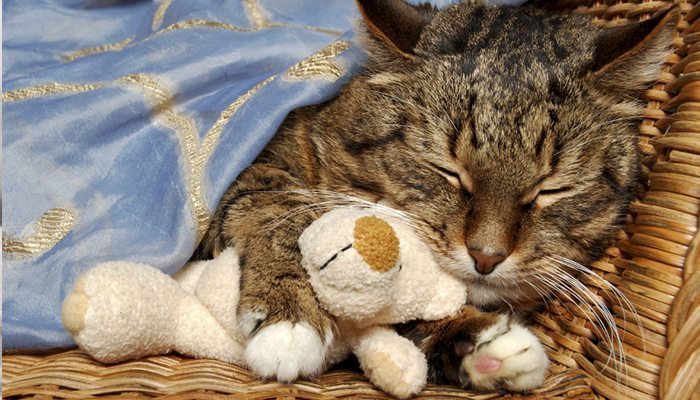“Your cat is, what…ten? She’s officially an elderly cat now, you know.”
 I just glared at the vet, half-heartedly attempting to cover Lucy’s ears. My cat wasn’t old. In my experience, old cats smelled funny and ate nothing but pureed chicken. My cat still smelled totally normal and ate Friskies indoor formula like a cat half her age. It never occurred to me that she was getting old.
I just glared at the vet, half-heartedly attempting to cover Lucy’s ears. My cat wasn’t old. In my experience, old cats smelled funny and ate nothing but pureed chicken. My cat still smelled totally normal and ate Friskies indoor formula like a cat half her age. It never occurred to me that she was getting old.
But within the next year she developed hyperthyroidism, a common affliction in cats over the age of ten. She lost half her body weight and now requires medicine twice daily. It’s a completely different experience within cat ownership, and sadly, it’s one that some cat owners are not prepared for. Elderly cats are often given away or neglected because their owners simply didn’t consider the entire lifespan of their pets.
Elderly cats are more susceptible to cancer, diabetes, inflammatory bowel disease, heart disease, kidney disease, arthritis, and a host of other issues that can affect your cat’s behavior, take a chunk out of your budget, and make a mess of your living space. So, how do you prepare? How do you balance giving your cat the amount of love and care he or she needs while dealing with these changes?
Let’s look at some ways to cope as you ease your cat into its golden years.
Keep up with vet care:
Take your cat to the vet for a checkup and make it a tradition. You might look at her now and think, “She’s fine! I’ll worry when she starts acting sick.” But cats can’t tell you if they aren’t feeling well, and often you won’t notice anything has changed until your cat’s symptoms become severe. By then, an illness could require expensive treatment. Organizations like The Humane Society offer lower priced vet care and payment plans, so the time is now to set up your cat’s appointment.
Invest in pet insurance:
Pet insurance is a good way to defray the costs of health care. But some plans have an age limit, so the sooner you start looking, the better your odds of finding a plan that’s good for you and your cat.
Monitor your cat’s behavior:
It’s easy to write off a cat vomiting or going to the bathroom in an odd place. But did you know that a change in your cat’s litter box habits could be a sign of bladder or kidney issues or inflammatory bowel disease? And frequent vomiting is a symptom of a number of health issues. If a strange behavior becomes a habit, or if you notice that your cat is gaining or losing weight quickly, take him to the vet.
Step up your cat care:
Cats frequently need their claws trimmed and to be brushed regularly. But a cat dealing with an illness might be less inclined to groom itself. So you have to be more diligent. Brush your cat at least once a week. If your cat is having litter box issues, try emptying the box more often or seek out a box with a lower rim for cats who may be suffering from pain issues.
Be patient:
Cats who are suffering from an ailment may be in pain. They might sleep more (or less). They have accidents and make messes and demand particular kinds of food. The most important thing to remember is that your cat needs your love more than it ever has before. So, it’s best to face every challenge with a healthy amount of patience.











